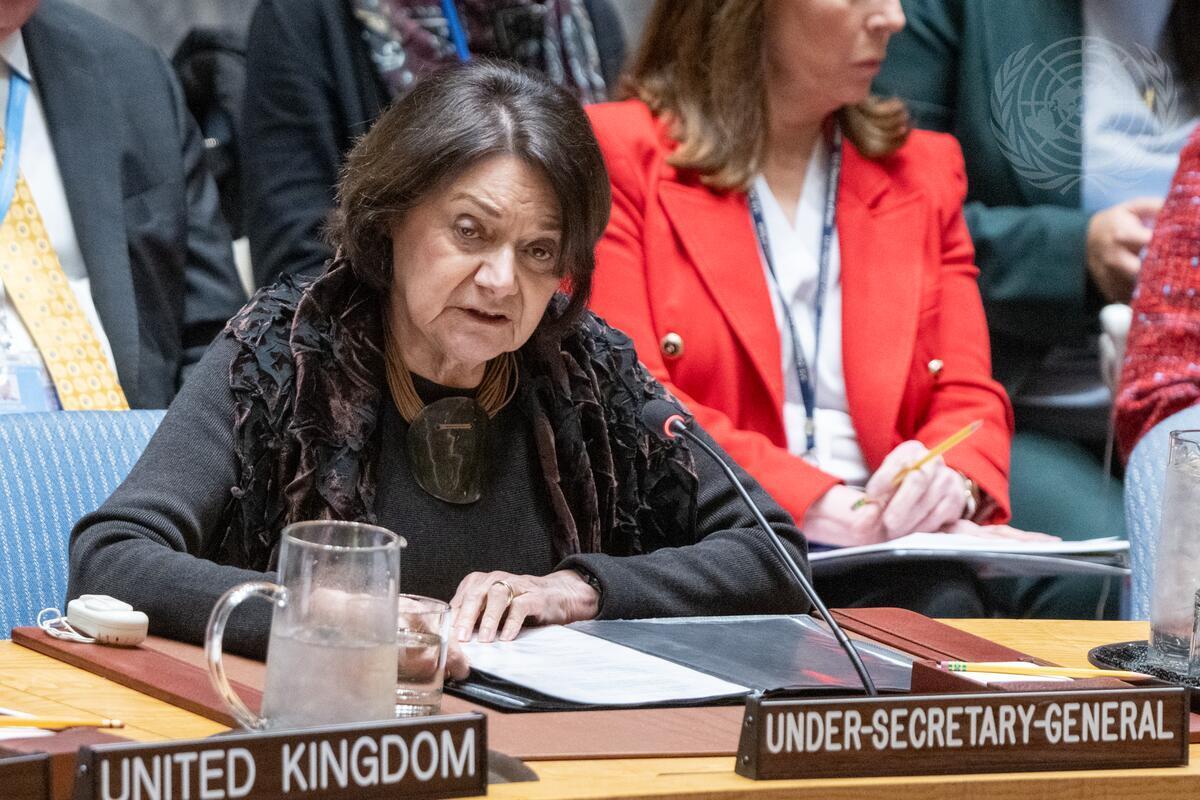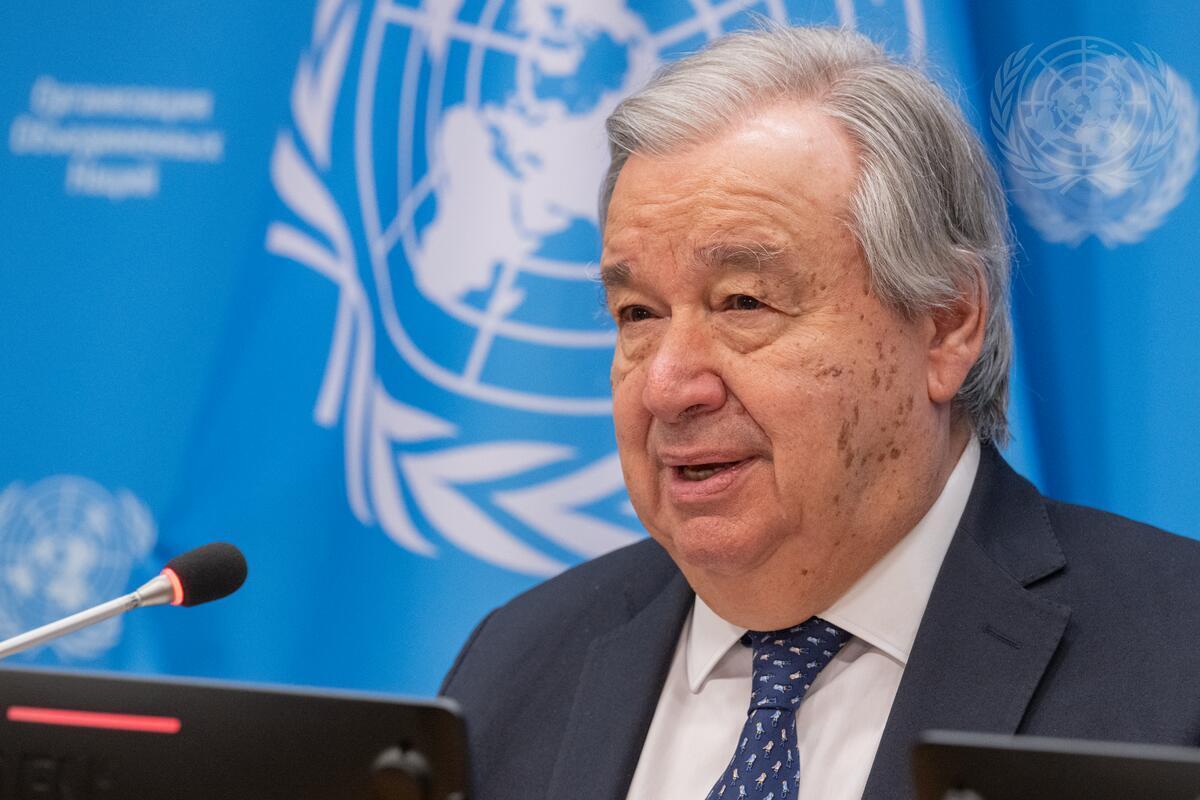Madam President,
Members of the Security Council,
I brief you today as the concerning trends we have seen in recent months continue throughout the Occupied Palestinian Territory (OPT).
Palestinians and Israelis are killed and injured in near daily violence – including just hours before this briefing when another fatal shooting attack killed an Israeli in the West Bank. This violence is fueled and exacerbated by a growing sense of despair about the future.
While the parties have taken some actions towards stabilizing the situation on the ground, unilateral steps, including settlement growth and demolitions, continue, as do Israeli operations in Area A, Palestinian militant activity and settler violence.
The lack of progress towards a political horizon that addresses the core issues driving the conflict has left a dangerous and volatile vacuum, filled by extremists on both sides. We are a long distance apart from the sentiments prevailing when the Oslo Accord was signed 30 years ago on 19 August.
Madam President,
Between 25 July and 15 August, 16 Palestinians, including five children, were killed and 59 Palestinians, including six women and 137 children, were injured by Israeli security forces (ISF) in the occupied West Bank during demonstrations, clashes, search-and-arrest operations, attacks and alleged attacks against Israelis, and other incidents. Another Palestinian was killed and eight others, including one child, were injured by Israeli settlers or other civilians in shooting attacks, stone-throwing and other incidents.
According to Israeli sources, one member of Israeli security forces was killed, and nine Israelis, including a woman and a child, were injured by Palestinians in shooting attacks, stone-throwing and other incidents.
As in previous months, many Palestinian casualties in the West Bank occurred in the context of Israeli operations and clashes in Area A. On 26 July and from 11 to 15 August, five Palestinians, including a 16-year old and a 17-year old, were killed by ISF in refugee camps near Nablus, Tulkarem and Jericho.
ISF also killed three Palestinians on 6 August, including a 15-year-old boy, near Jenin when ISF opened fire on their vehicle. According to a statement by Israeli security agencies, the three intended to carry out an imminent attack against Israelis. All were claimed as members by Palestinian militant groups.
In another incident, a 13-year-old boy died by an improvised explosive device in Qalqilya on 26 July.
Palestinians also carried out attacks or alleged attacks against Israelis. On 25 July, three Palestinians claimed by Hamas opened fire towards an Israeli checkpoint near the Mount Gerizim community, in the northern West Bank and were shot and killed by ISF. On 1 August, a Palestinian shot and injured six Israelis at a shopping mall in the Ma’ale Adumim settlement, before being killed by ISF. The same day, ISF shot and killed a 15-year-old Palestinian boy who allegedly attempted to stab two Israeli soldiers near a settlement, south of Hebron. On 5 August, a Palestinian from Jenin shot and killed a municipal patrolman in Tel Aviv, before being killed by a second patrolman.
Turning to settler-related violence, on 2 August an Israeli guard of the Ofra settlement fatally wounded a 17-year-old Palestinian after he reportedly threw a Molotov cocktail toward the settlement. On 4 August, armed Israeli settlers from the nearby outpost of Ramat Migron approached Burqa village near Ramallah, leading to stone-throwing confrontations with Palestinians. Settlers fired live ammunition, killing a 19-year-old Palestinian and injuring another; one Israeli was injured by Palestinians throwing stones. Israel Police arrested two Israelis on suspicion of involvement in the killing; six Palestinians were also arrested. Two days prior, settlers from the same outpost reportedly installed a tent and grazed sheep on private Palestinian land near the village.
Madam President,
As the violence spirals, I again reiterate that all perpetrators must be held accountable and swiftly brought to justice. Violence against civilians, including acts of terror, are unacceptable and must be condemned and rejected by all.
Security forces must exercise maximum restraint and use lethal force only when strictly unavoidable to protect life.
Madam President,
Turning to settlement-related developments, on 3 August, the Israeli Supreme Court dismissed a petition to dismantle an outpost established in the former settlement of Homesh, in the northern West Bank, evacuated as part of the 2005 Disengagement Law. The outpost had been set up following an amendment to that law by the Israeli Knesset in March, lifting the ban on Israelis entering the area.
On 7 August, the Jerusalem District Planning Committee advanced plans for approximately 2,000 housing units in the settlements of Nof Zion and Ramat Alon in East Jerusalem.
On 14 August, Israeli security forces demolished four structures in an outpost near Kokhav Hashahar settlement in the West Bank.
I reiterate that all settlements are illegal under international law and a substantial obstacle to peace.
Israeli authorities demolished, seized or forced owners to demolish 58 Palestinian-owned structures in Area C and six in East Jerusalem, displacing 28 Palestinians, including 14 children. The demolitions were carried out due to the lack of Israeli-issued building permits, which are nearly impossible for Palestinians to obtain.
On 17 August, a Palestinian elementary school in Ein Samiya serving nearly 80 pupils was demolished days before the start of the school year – the third such demolition in the past year.
I call on Israeli authorities to end demolitions of Palestinian-owned property and the displacement and eviction of Palestinians, and to approve additional plans that would enable Palestinians to build legally and address their development needs.
Madam President,
In July, Israel ended the additional monthly deductions of some USD 14 million from Palestinian clearance revenues that began in February. Some USD 14 million continues to be withheld each month in line with an Israeli law mandating the withholding of what Israel says the Palestinian Authority (PA) pays to perpetrators of attacks against Israelis, or to their families.
The PA’s fiscal state remains dire with a projected deficit of more than 370 million USD for 2023. Austerity measures have resulted in significant reductions to civil servant salaries and social assistance.
Meanwhile, funding shortages continue to curtail UN agencies’ ability to provide crucial services to Palestinians. To get to the end of the year, UNRWA needs USD 75 million urgently to maintain food assistance for 1.2 million Palestinians in Gaza, while the World Food Programme requires USD 41 million to restore its operations across the OPT.
Worryingly, more than halfway through 2023, the humanitarian appeal for Palestinians throughout the OPT is funded at just over thirty per cent.
I encourage Member States to maintain and increase their funding to UN agencies and humanitarian partners to ensure that they can continue delivering vital services on the ground.
Madam President,
On 30 July, President Mahmoud Abbas chaired a meeting of Secretaries-General of Palestinian factions in El Alamein, Egypt, which he convened following the major Israeli military operation in Jenin. Senior officials from Hamas and other Palestinian factions participated, while Palestinian Islamic Jihad refused to attend. In a subsequent statement, President Abbas called for a follow-up committee to complete dialogue on the issues discussed to “end divisions and achieve Palestinian national unity.”
On 10 August, President Abbas issued a Presidential Decree, retiring 12 of 16 PA Governors and establishing a committee to recommend candidates to the President for selection.
On 14 August, following a consultative meeting organized by Hamas, the movement welcomed the call by factions to hold local elections in Gaza.
Madam President,
Turning to Gaza, the cessation of hostilities continued to hold. Nevertheless, the humanitarian situation remains dire. The reporting period saw higher-than-normal electricity shortages of up to 12 hours per day, driven by a lack of capacity to meet soaring demand during the summer. On 1 August, the Gaza Power Plant increased electricity supply by nearly two hours a day thanks to additional funding from Qatar.
The power cuts sparked popular protests directed at Hamas authorities over living conditions, with thousands of Palestinians taking to the streets on 30 July. Video images of Hamas security forces beating protesters circulated widely. The protests were matched by Hamas-led counter-protests against the Israeli closure regime.
In violation of Palestinian law and of the State of Palestine’s international obligations, seven civilians in Gaza were sentenced to death for collaboration with Israel after a Hamas military appeals court upheld or strengthened previous sentences. I echo the Secretary-General in highlighting that the UN opposes the imposition of the death penalty in all circumstances.
Madam President,
Turning to the region, on the Golan, the ceasefire between Israel and Syria has been generally maintained. However, the situation has remained volatile due to continued violations of the 1974 Agreement on Disengagement of Forces by both parties.
In Lebanon, violent clashes in the Ein el Hilweh Palestinian refugee camp between Fatah and Islamist factions have led to at least 13 fatalities, with over 50 people injured. I echo the messages of the Special Coordinator for Lebanon in urging all actors to exercise restraint and to avoid any further violence.
As tensions along the Blue Line continue, including with respect to the disputed Shab’a Farms area and Ghajar, I urge political leaders in Lebanon and Israel to refrain from inflammatory rhetoric. I further urge the parties to continue their close engagement with UNSCOL and UNIFIL to defuse tensions and avoid any escalation, in addition to upholding their respective obligations under Security Council resolutions 1559 (2004) and 1701 (2006).
Madam President,
Since my last briefing, we have witnessed a continuation of the negative trajectory that has marked this conflict for far too long. Violence continues on the upswing, with over 200 Palestinian and nearly 30 Israeli fatalities in the West Bank and Israel thus far this year, already surpassing 2022 annual figures, and the highest figure since 2005. Settlement expansion continues unabated. The fragility of the PA fiscal situation, compounded by funding shortages facing key UN agencies, threatens to worsen the plight of the most vulnerable Palestinians.
While we must urgently focus on addressing the most critical issues and on de-escalating the situation on the ground, we cannot ignore the need to restore a political horizon.
The United Nations remains firmly committed to supporting the parties to achieve an end to the occupation and the establishment of a two-State solution, in line with UN resolutions, international law and previous agreements.
Thank you.






